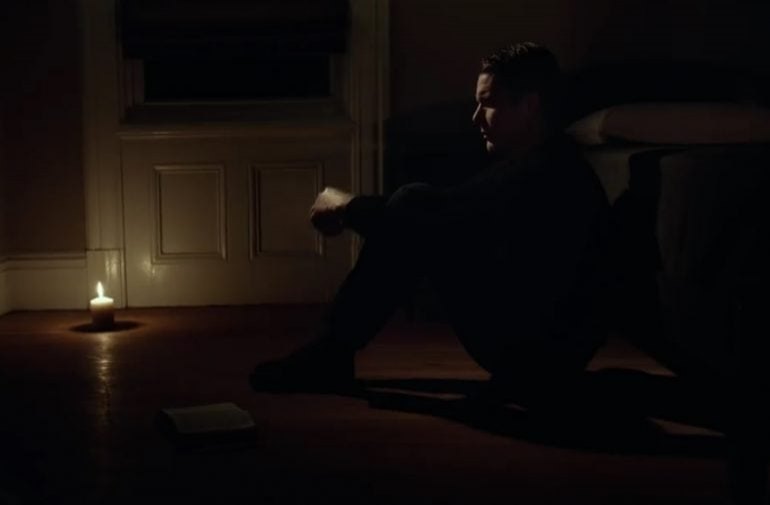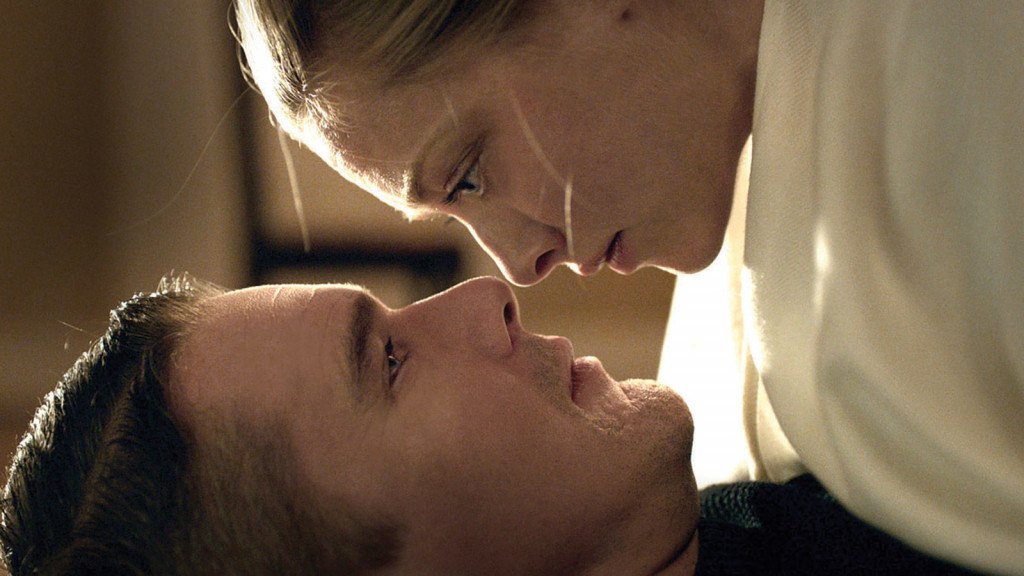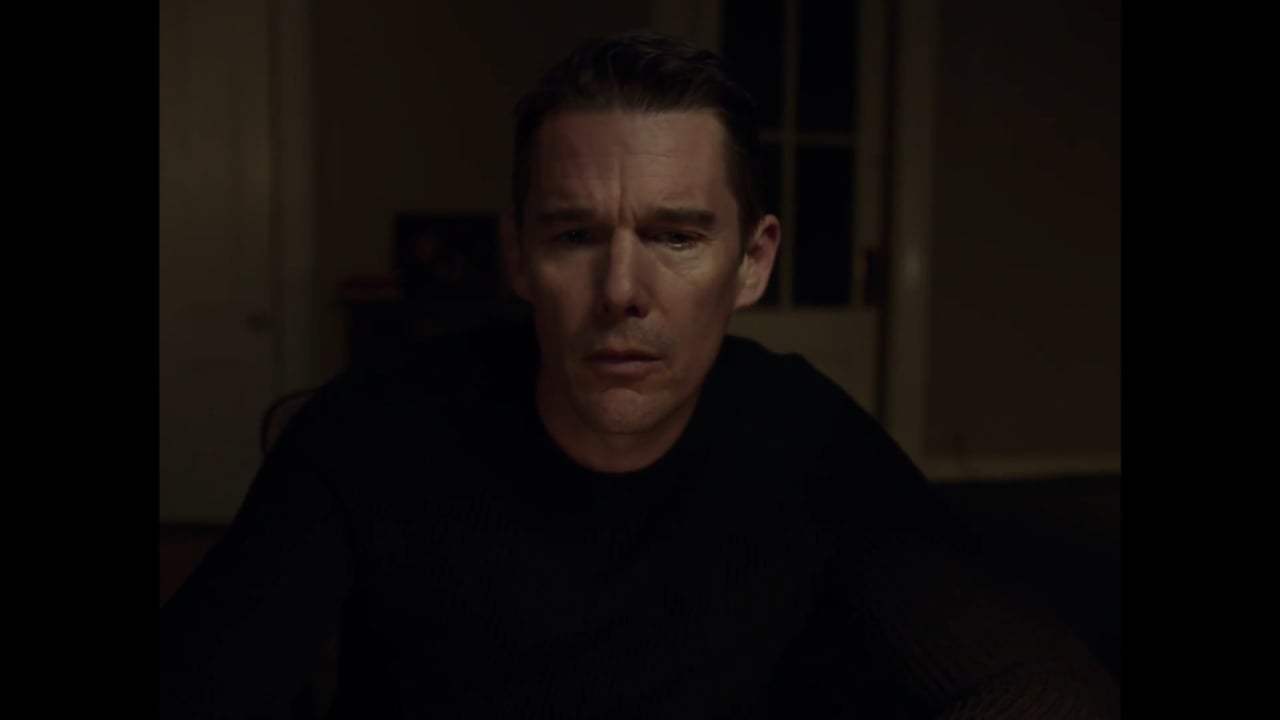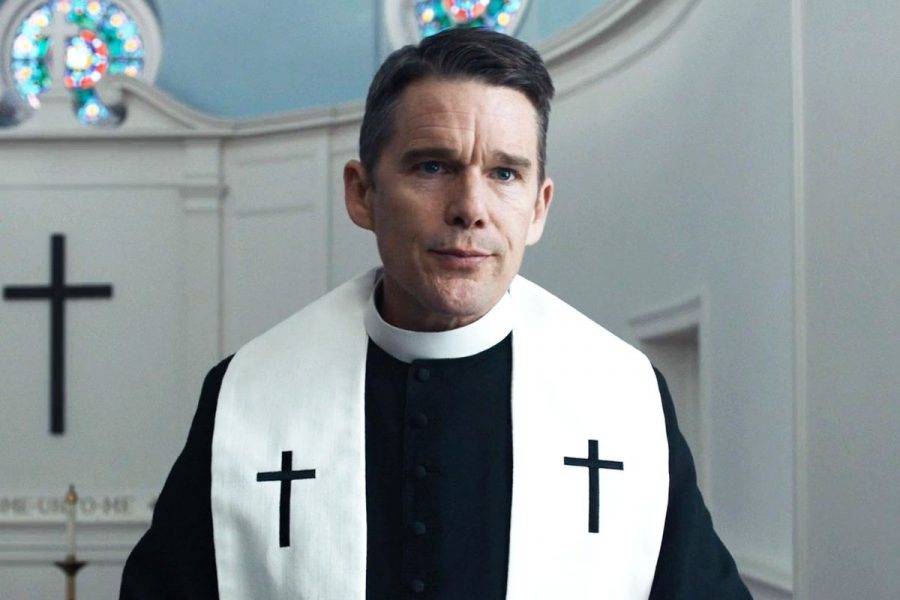“Someday a real rain will come and wash all this scum off the streets.” If you’ve seen the film I’m referring to, ‘First Reformed’ will be one of your best movie experiences this year. ‘Taxi Driver’ is a watershed moment in the history of cinema, not only for its hypnotic style and heightened depiction of violence, but for finding a contemplative interface between faith and cinema. The character of Travis Bickle has assumed a sort of divine status over the years; actors try desperately to replicate De Niro’s stunning animation of solitude, while writers endeavor to match the penmanship of Paul Schrader. It can be safely said, though, that no one has been able to emulate the feat. Until now, even though just the latter part. And the man to do it again is Schrader himself.

‘First Reformed’, in many ways, is a spiritual companion to Paul Schrader’s magnum opus, ‘Taxi Driver’. While the latter greatly benefited from the craftsmanship and vision of one of the greatest filmmakers of all time, the former bathes in the glory of its creator’s seminary background and ascetic understanding of religion. ‘First Reformed’ centers around the life of a former military chaplain, Ernst Toller, who finds himself boxed in the mechanical square of the camera and the vicious circle of life. His transition of thought and culmination of desire for atonement and redemption serves the narrative akin to the manner in which Bickle’s abhorrence of the human society assisted ‘Taxi Driver’.
It is almost bewildering how Schrader’s immense talents draw the two contrasting protagonists, drastically distanced from the other, together in the same light. Reverend Toller is a man of the collar, well-respected by his pupils, and a grieving father dealing with the loss of a child; Bickle, on the other hand, shares nothing with Toller in his outlook of the society and vice versa, apart from their military background and moments of epiphany. Bickle and Toller are also different in the way they have processed into the personalities that they are, even though Bickle is much younger. They both pen a journal on a daily basis, interacting with their inhibitions, at times in conflict, others abnegation. Their initial exploration of the world around them is ironically similar in temperament, though different in physicality. While Bickle’s perspective is largely confined to the dark, unforgiving nights, Toller experiences the world in a much warmer, solemn context.
For Travis, the female body is a vile tempest; unfathomable, impregnable: for Toller, it is companionship and a celebration of life. Urban decay, exacerbated by the onset of capitalism and consumerism, wraps both the protagonists in its mist and shrouds them with an intangible force much powerful than their faculty to see optimism and happiness in life. Therefore, viewing ‘Taxi Driver’ in a different light than ‘First Reformed’ would be a futile exercise and a decision that fails the other-worldly gifts of Schrader altogether.
Along with ‘Taxi Driver’, Schrader heavily draws on Mr. Ingmar Bergman’s similar questioning of faith through a pastor in an existential crisis, ‘Winter Light’. While the movies are definitely engineered in a strikingly similar fashion- the boxed narrative, the frugal camera movements, and wilfull, verbose close-ups- the two movies digress on their protagonist’s purpose and crisis. Pastor Tomas suffers in his His glorious shepherd’s silence, Revered Toller exhausts deliberation on God’s reaction to modern-day industrialization and destruction of nature. “Will He forgive?” is the question that is deeply-rooted at the core of the film. Bergman and Schrader tread on similar plotlines that involve a conflicted man of the collar, a man scared of living in the world washed with suicidal tendencies, and paranoia that has become an inherent feature of contemporary society. I’d call the three films as spiritual sisters, each giving another dimension to the other while still standing out as individual films.
The Plot

‘First Reformed’ is set in the decaying town of Snowbridge in New York and derives its title from the church which houses our deeply-conflicted protagonist. The washed-off, pale snow grows trees with no leaves; trees that stand tall in agony, weathering the harsh climate. The raucous atmosphere is placated to some extent by the color and grandiosity of First Reformed’s parent organization and near neighbors, Abundant Life. The Dutch-style architectural structural is reduced to merely sufficing as a tourist spot, unable to attract crowds for mass services. Reverend Toller runs the day-to-day of the place and operates from his adjoined apartment, which is as empty as Toller on the inside, and as orderly as on the outside.
In the handful of people who attend his sermons, a pregnant Mary Mansana approaches Toller to pacify his husband’s fears about climate change. The following day, Toller visits the Mansana’s and has a conversation with Michael, a devout activist, about nature and God’s creation. The tense conversation carries an impalpable sense of faith and pride in both the men, who mutually realize God’s will and purpose of mankind. In the long soliloquy-styled exchanges, Michael apprises Toller of his apprehensions of bringing a child into the world and contemplates abortion. The conversation proves to be inconclusive as Michael triggers Toller’s fading faith and instills in him the impact of humanity’s acts and God’s reaction.
The plot derives from its well-developed characters story threads, which even though fail to solidify cohesively in the end, make for a great viewing. Mary discovers a suicide vest in her garage, built by Michael, instantly notifying Toller of the infraction. The two decide against going to the authorities, as it would further isolate Michael from normalcy. This is probably the moment where they should have confronted Michael. Talking always helps. When emotions and feelings block your heart, one’s ability to think also takes a hit. So probably talk everything out with someone. Anyway, when Toller is called by Michael for their second meeting, he discovers Michael has committed suicide, blowing his head off with a rifle.
As the story progresses, Toller gradually associates with Michael’s motives and activism, himself questioning the nature of the relationship between his parent church, Abundant Life, and Mr. Balque, the ruthless industrialist. He begins to study more and more, as his health deteriorates. Fears of stomach cancer loom over Toller’s head, impacting his role as Reverand and profile at the church.
On the eve of the 250th anniversary of First Reformed, Abundant Life arranges a grandeur event, inviting important dignitaries. Toller is obviously aware of the plans and concocts a devilish fate for the incoming guests. The night before, Mary comes to visit him and engages in probably the most bizarre and meaningful scene of the movie. In a platonic exercise, Mary lays on top of Toller and the two seemingly transcend into a space that is perfectly theirs, idyllic in the peaceful lap of mother nature. The striking visuals, depicting with a ferocious and unflinching honesty the purity that stands distorted by human hand, immerse the two characters and the viewer. It goes along with the transcendentalist style and tone that the movie carries in its running time.
After that experience, Toller, having grown dangerously affectionate to Mary, advises her to not attend the celebration at First Reformed. The revelation comes as a surprise for Mary, who wants to “be there” for Toller. Eventually, she heeds Toller’s advice and promises him to not attend the event, unaware of what is going to happen. The judgment day arrives. The stage is set. Toller nervously patrols the window looking out for Mary’s unprecedented arrival. To his great disappointment, Mary does show up, in a hoody, with her identity concealed, to maybe surprise Toller. This sends the Reverand in an uncontrollable rage which sees him inflict himself with barbed wire and prepare to die. Mary unexpectedly interrupts, and the two engage in a passionate kiss. The screen goes black.
The Ending

Okay. Let us talk now about that ending. ‘First Reformed’s idea and spiritual concepts are deeply-seated in the values of religion and faith. Having said that, the ending was completely unexpected and bizarre, seeing the two protagonists embrace and meet. Let’s rewind a bit. In a couple of scenes earlier, we saw Pastor Jeffers grow out of his patience and personally beckon Toller’s presence in the congregation. He is unable to do so, with the door locked and the Reverand unresponsive. Later, Mary barges in, with the door merely a semblance of an obstacle, embracing and kissing Toller. How is that possible?
Now, there are two things which Schrader could have meant with the ending. First, is the more obvious and believable: Toller has either killed himself, by drinking pepso, or, he has gone ahead and denotated the suicide vest in the house itself. The second interpretation, which is more meaningful and subtle, can be Mary’s ability to connect with Toller on a deeper level than mere physical attraction, like the spring that rejuvenates trees laid bare by the harshness of the fall; a redemption in life that will set Toller free from his afflictions and the past that haunts him in every breath he draws. After his wife, Mary is her ticket to normalcy and happiness.
The film’s open-ended climax draws upon its staggered and uncomfortable journey. In comparison to Schrader’s iconic ending in ‘Taxi Driver’, ‘First Reformed’ finishes on a similar note. Blood holds great importance in Judaist-Christian traditions of faith. Jesus Christ descended on earth to absolve humanity of its Original Sin and crucified himself. The blood that he shed was the purest of us all, wielding great power to correct evil or misgivings. Toller’s expression heavily draws from this inference, when he inflicts himself with the barbed wire. A reference can be made to the baptism scene in PTA’s magnum opus, ‘There Will Be Blood’, where Plainview is compelled to acknowledge the power of the ‘blood’ and correct his great sin of abandoning Plainview Jr.
Unlike Travis Bickle’s washed up, satisfied face in ‘Taxi Driver’s end, Toller shows feelings of incompleteness and discontent, unable to shed the blood of corrupt men who’ve gained personal profits at the cost of mother nature. Toller’s highly sensitive attitude toward Mary doesn’t stop him from embracing her, and potentially hurting her and her child, which means that maybe he knows it won’t hurt her. It indicates a sub-conscious acceptance of what has already happened and a cue to what will happen next.
In a lot of ways, the state of First Reformed reflects Reverend Toller’s personality and physical well-being. The 250 years old church is merely a tourist attraction and is valued to the extent of its economic feasibility and appeasement. The worn-out furniture; the difficult conditions it has survived in; and the sparse human connection and intimacy are all mirrored by Toller. It is only in the end that Mary gives him new meaning in life and an opportunity to create a new existence for himself.

In an interview with DP/30, Schrader says, “I used the freedom of having the final cut to do something constrained. I used that freedom in ‘Dog Eat Dog’ to do something outrageous, while in ‘First Reformed’, I used that freedom to not move the camera; to be restrained; to be ascetic.” The ascetic camera certainly loses its way at the end, which sees it swerving around the protagonists almost uncontrollably, as if it had been unhinged. Much like Bergman in ‘Winter Light’, Schrader is particular about how he boxes in his character with no way out. It lends a very distinct and derivative importance to the struggle between faith and consequentialism. The ending depicts something similar: Toller, helpless; a prisoner in his own house after Mary’s arrival. Interpreting the ending would require taking into account all that has gone into making it. The pressure, an abstract, intangible sword hanging on Toller’s head, gradually sinks in and makes him miserable.
With poignant imagery, Schrader says a thousand words. Toller’s muffled screams in his cloak give an impression of how suppressed his individuality has been by the Catholic institution. The scream releases a lot of annoyance that coagulated and subverted Toller throughout the movie. ‘FIrst Reformed uses Schrader’s seminary background and Toller’s veteran past as a way to bridge his religious training and sacred past with his profane present.
Final Word
Impeccably written, thoughtfully executed, and breathtakingly performed, ‘First Reformed’ by no means is a perfect film; but it is its inherent flaws which give it a heart and makes it human and able to arouse human compassion and empathy. Ethan Hawke’s special performance is an example for other actors to follow. The restraint and humaneness he shows in playing Toller is truly extraordinary and deserves great commendation. ‘First Reformed’ marks glorious return to yet another intense character study — and exploration of religion — for Paul Schrader.
Read More in Explainers: Baby Driver | Gone Girl | The Usual Suspects


You must be logged in to post a comment.